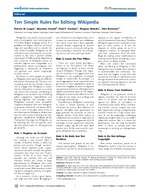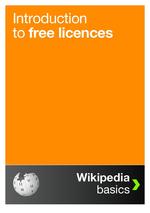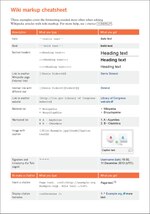WikiZimbabwe/Inaugral meeting
This page documents an introductory Wikimedia training day for members of the newly formed WikiZimbabwe volunteer group. The objective is to introduce new Wikipedians to the many options they have and to assist in their effort to engage Zimbabwean content on the Wikimedia projects.
The event is part of the Wiki Loves Africa 2016 competition and is part of the continent-wide WikiAfrica movement. The event is supported by the following local partners:
- Goethe-Centre
- GIZ
Meeting details
[edit]- Date
- Time
- Venue
Participants
[edit]Sign your name with 4 ~s
- Apologies
Pre-attendance tasks
[edit]- create a Wikimedia username by registering here:
- bring a laptop or other communications device
Schedule
[edit]- Create a Wikimedia userpage
- Create a userpage on another Wikimedia userpage and link them
- Use talk pages
- Start or edit a Wikipedia page
- Upload an image to Wikimedia Commons
- Discussion on Gold Coast community work through Wikimedia projects
Feedback
[edit]Please write your feedback about the event here ... remember to sign all your comments with the 4 ~s to sign your name.
Budget
[edit]Total:
Other workshops and sessions to follow
[edit]Resources
[edit]Introducing the Wikis
[edit]| Teaching to learn | With the great outdoors | Reaching more people | In all languages | I'm a volunteer too |
|---|---|---|---|---|
| Dumisani Ndubane taking about his use of Wikiversity for electrical engineering | Mike Cline talking about how he uses Wikipedia to extend his outdoor pursuits | Veteran maths teacher, Poongothai Balasubramanian uses Wikipedia to extend her teaching | Ganesh Paudel explaining how Wikipedia can be created in all languages | Founder, Jimmy Wales explaining the beginnings, and his role today |
Information about Wikipedia
[edit]- The Impact of Wikipedia A series of powerful videos of people from around the world explaining how Wikipedia has made an impact on them.
- Contributing to Wikipedia
- Wikipedia is not about YOU!
- Featured content on Wikipedia Featured content is the best Wikipedia has to offer, via vigorous peer review. Presented by type: Featured articles · Featured lists · Featured pictures · Featured portals · Featured sounds · Featured topics
- Featured content on the other projects
- Good Article criteria
- Wikipedia in projects at schools and universities
- Best practices in assigning Wikipedia articles as coursework to students
- Robert E. Cummings: Are We Ready to Use Wikipedia to Teach Writing?, in: Inside higher Ed (March 12, 2009)
- Academic studies of Wikipedia
Other projects under the Wikimedia Foundation
- Wikipedia
- Wiktionary
- Wikiquote
- Wikibooks
- Wikisource
- Wikispecies
- Wikinews
- Wikiversity
- Wikivoyage
- Commons
- Wikidata
- MediaWiki
Tutorials
[edit]There are several kinds of introductions to Wikipedia. Some you can do yourself, others you can with others.
- The Wikipedia Adventure
- Wikipedia Training Manual - A collaboration between the State Library of Queensland and Wikimedia Australia
Suggested training modules
[edit]- What is Wikipedia + How a ragtag band created Wikipedia (video)
- Before you start writing
- Editing Wikipedia
- Getting to know your topic area
- Getting started
- edit source vs. edit beta
- Working in a sandbox
- Text editing
- Citing sources tutorial
- How do I use talk pages?
- How to use a sandbox for stub articles and new articles
- My watchlist and how to use it
- Images, media and Commons.
- Creative Commons and Free licences
- Suggested plan for teachers
- Introduction for students to Wikipedia
Mechanics of editing Wikipedia
[edit]These printable PDF documents are designed to be handed out to students, either as part of a packet at the beginning of a Wikipedia assignment, or throughout the term at appropriate points.
- Wiki markup quick reference – This one-page quick reference (included in the Welcome to Wikipedia brochure) helps you to remember the most frequently used wiki markup codes.
- References – This handout explains why references are important, what the expectations for sourcing on Wikipedia are, where to place references, and the basics of adding "ref" tags.
- Reference formatting – This handout explains in more detail how to create footnotes for citing sources, and how to cite the same source multiple times.
- How to get help – explains the recommended way to get help and feedback for classes supported by Wikipedia Ambassadors: by posting on their course talk page and notifying their mentor. It also includes a glossary of additional help resources students might use.
- Plagiarism – explains what plagiarism is on Wikipedia—including "close paraphrasing"—in addition to why and how to avoid it.
- Convert tables and charts to wiki code or image files - Here are some tools, resources, tips, and instructions for converting tables and charts to wiki code or image files. Most of the tools and resources are free.
| Starting a sandbox article | Basic editing: bold and links | How to use a watchlist | How to use talk pages |
|---|---|---|---|
| How to start an a sandbox page to play around with wiki markup or start an article draft (2m 11s) | How to use the most basic features of wiki markup to create bold text and links to other pages (3m 37s) | How to use a watchlist to keep track of pages you are interested in or have edited (2m 10s) | How to interact with other editors using talk pages, including article talk pages and user talk pages (2m 30s) |
| Basic editing: citing sources | Citing sources with RefToobar | Uploading files to Wikimedia Commons |
|---|---|---|
| How to add citations using "ref" tags (2m 3s) | How to use the 'Cite' tool for inserting automatically formatted references (2m 24s) | Uploading files such as images to Wikimedia Commons, using the upload wizard (2 min 48 sec) |
Writing articles
[edit]| Article creation | Article improvement | Article assessments | Article evolution |
|---|---|---|---|
| A demonstration, recorded live, of how to create a Wikipedia article (7 min 50 sec) | A look at how to assess the shortcomings of an article and improve it (4m 22s) | An exploration of the standard article assessment system, with examples of each quality level (11m 30s) | A trip through the history of an article, from humble beginnings to Good Article status (6m 25s) |
Analysing Wikipedia
[edit]- Why Wikipedians are the Weirdest People on the Internet (YouTube) – a humorous presentation by Wikipedian Steven Walling about the culture of Wikipedia and its editors.
- Wikipedia Vision – an animated map that highlights live edits from users around the world as they happen, demonstrating the global nature of the project.
- wikistream – a visualization showing a stream of edits to the most popular Wikipedia projects.
- Live feed of all edits – a feed that outputs every new change to English Wikipedia, demonstrating the pace of Wikipedia's evolution: 1–2 edits per second. Requires an IRC client to view.
- Wikipedia article traffic statistics – a tool for charting how many hits any given article gets, great for comparing different kinds of articles at different times, e.g., Genetics (in the school year) vs. (in the summer), or YouTube (with weekend spikes) and Simpsons (with spikes when new episodes come out). Students can also use it to see how many people are reading their articles over the course of the class (and beyond).
- Manypedia – a tool for comparing a specific Wikipedia page from a language edition Wikipedia (for example, English) with its equivalent page on another language edition Wikipedia (for example, Arabic), exploiting automatic translation and additional statistics about both pages such as number of edits and editors.
- WikiTrip – a tool for visualizing the animated evolution in time of two kinds of information about the Wikipedians who edited the selected page: their location in the world and their gender.
- Mapping Wikipedia - World map visualisations of Wikipedia editing activity





